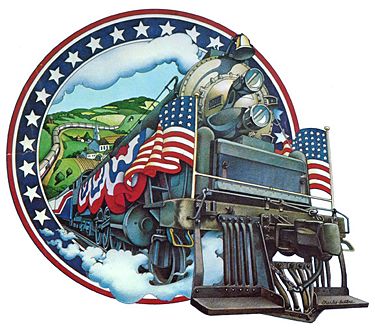American Freedom Train
The American Freedom Train was a national educational tour which brought notable American artifacts to railroad stops across the country during the celebrations of the Bicentennial of the United States. It began its journey in Alexandria, Virginia on December 19, 1974 and came to a stop in Miami, Florida on December 31, 1976.
The 26-car train included 10 exhibit cars which were opened to the public and two cars that held larger artifacts behind showcase windows visible from the exterior. The exhibit consisted of over 500 objects selected to tell the story of America's successes.
The Freedom Train stopped in Birmingham on May 27-31, 1976. While here it changed locomotives, picking up a newly-restored Reading 2101 "T-1" and dropping off its Southern Pacific 4449 "Daylight" engine for servicing at Southern Railway yards. Also in Birmingham the Pacific Northwest tool car #76 that trailed the locomotive was finally painted with the "American Freedom Train" lettering.
After being refurbished in Birmingham, the 4449 made a steam excursion to Alexandria, Virginia in August 1976. It then carried a cross-country excursion from Birmingham to its home in Portland, Oregon from April 13 to May 1, 1977. It continues to run steam excursion services from Portland's Oaks Park Station.
Preceding the Freedom Train in Birmingham was a General Motors-made Union Pacific E-9A #951, dubbed the "Preamble Express". That train arrived on October 7, 1974, having scouted the route from New Orleans, Louisiana.
Exhibits
Car No. 1-The Beginning
- Revolutionary War muskets and equipment
- First printed draft of the U. S. Constitution
- A 1756 edition of Poor Richard's Almanack
Car No. 2-Exploration and Expansion
- The Louisiana Purchase, Oregon Compromise and Gadsden Purchase treaties
- General Mariano Vallejo's traveling silver chest
- Alan Shepard's practice mission flight suit from the Apollo XVI mission
- a lunar breccia
Car No. 3- Growth of the Nation
- Photo mosaic of land development
Car No. 4-Origins
- Arapaho war bonnet
- The Burlingame Treaty with China
- Emma Lazuras' manuscript for "The New Colossus"
- Africa Chi-Wara carving
- Puerto Rican santos sculptures
Car No. 5-Innovations
- Remington Model No. 1 typewriter
- Patent models for a harvester, milk cooler, coal stove and brick-making machine
- 1920s picture tube and 1930s television receiver
Car No. 6-Human Resources
- Benjamin Franklin's postal appointments
- A 1784 edition of the Salem Gazette
- Civil War-era microscope and bullet extractor
- Thomas Paine's Common Sense
Car No. 7-Sports
- Golf clubs from the 1770s to the present
- The Heisman trophy and Outland plaque
- Hank Aaron's 714th home run ball and bat
- The Oakland A's' 1973 World Series trophy
- The Philadelphia Warrior's 1947 NBA championship trophy
- Bob Lanier's basketball shoe
Car No. 8-Performing Arts
- Robert Redford's 3-piece suit from The Sting
- Jack Benny's violin
- Cecil B. DeMille's working script for The 10 Commandments
- An "Oscar" award statuette
- Judy Garland's dress from The Wizard of Oz
- An "Emmy" statuette
Car No. 9-Fine Arts
- Albert Bierstadt's "Rocky Mountain Waterfall"
- Archibold Willard's "The Spirit of '76"
- John Sloane's "Snow. Bonfire"
- Jacob Lawrence print from the Migration Series
- Frederic Remington's "Bronco Buster"
Car No. 10-Conflict and Resolution
- Abraham Lincoln's stovepipe hat and law books
- James Wyeth's "Portrait of President John F. Kennedy"
- Martin Luther King, Jr's bible
Cars 11 & 12-Showcase Cars
- Lunar "Rover"
- 1904 Oldsmobile "Old Scout"
- 1849 hand-pumped fire engine used to extinguish a fire at the U. S. Capitol in 1851
- 1834 Grasshopper type B&O railroad engine
1940s Freedom Train
An earlier Freedom Train which toured the country in the late 1940s was scheduled to stop in Birmingham, but did not because the city's requirement that the attraction be opened only on a segregated basis was not accepted by the sponsoring American Heritage Foundation. In addition to Birmingham, the train's stop in Memphis, Tennessee was also cancelled for the same reason. Following the well-publicized cancellation, other cities amended their requirements and the train did make numerous stops in other Southern cities, including Mobile, Montgomery and Tuscaloosa (on December 28, 1947).
